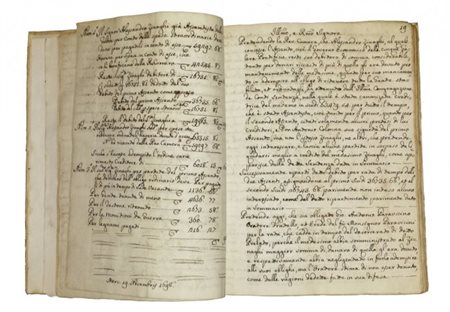 Bibliopathos - Via Enrico Toti 1, 37129 Verona
Bibliopathos - Via Enrico Toti 1, 37129 Verona
Medieval Notary Manuscripts & Law Books Sessione Unica - dal lotto 1 al lotto 280
Monday 28 December 2015 hours 17:00 (UTC +01:00)
AN INTERESTING AND UNCOMMON CASE IN PAPAL STATEVarious...
AN INTERESTING AND UNCOMMON CASE IN PAPAL STATE
Various Lawyers.R(everendissi)mo D(omino). Molines Decano Romana Assentistatus, seu Relevii Pro Ill(ustrissi)mo D(omino). Jo(s)e(pho) Antonio Paravicino herede R(everendi) P(atri) D(omini) Josephi Paravicini Contra Rev(erendam) Cameram Apostolicam. Romae, typis Rev(rerendae). Camerae Apostolicae, 1698.
Folio, contemporary stiff vellum, ff. 200 (= pp. 400). Text in Latin with many passages in Italian.
Very interesting documents of a scarce case of asiento between the Apostolic Camera (today "Papal Treasury") and Alessandro Zinaghi, architect of Pope Alexander VIII and Innocent XII.
Alessandro Zinaghi received two different asientos (see below) for five papal galleys: then he died without paying the debts for the enormous operating costs for the management of the ships: at his death the debt with the Apostolic Camera was 63,479.34 Roman Scudi.The Apostolic Camera sued the noblemen Antonio Paravicino and Antonio Colonna for the payment of the debts; the first one because was the heir of the papal treasurer responsible of the first asiento (sum to pay 36,735.66 Roman Scudi); the second one because he was Zinaghi's guarantor (sum to pay 26,743.68 Roman Scudi).
Both Paravicino and Colonna refused to pay Zinaghi's debts: these manuscript are the documents, preceding the printed version, of the complicate case (discussed between 29 November 1698 and 3 February 1699), with Paravicino against Colonna and both Paravicino and Colonna against the Apostolic Camera, with a defense counsel formed by the most authoritative lawyers of the time: Jacopo Sardinius, Johannes Julianus, Carolus de Ferraris, Petrus Corradinus and Franciscus Maria Panarius.
Such a deployment of forces is better understood calculating the purchasing power of a Roman scudo, that was approximately equal to $70: Zinaghi’s debt amounted to 4,443,553 US dollars today.
The great (and absent) protagonist of this tangled affair, Alessandro Zinaghi, was the architect that made the very expensive (100.000 Roman Scudi) project to restore the harbour of Anzio, in Papal State: not on the old site but to the east of it, with the opening to the east, a mistake which leads to its being frequently silted up; it has a depth of about 5 metres. According to these documents, we can suppouse that he wanted to start a business in the new harbour with the papal galleys. The historian Rasi describes Zinaghi (p. 32) as uomo di molta abilità nei maneggi («a very able man in monkey business»).
The general meaning of assento or, in Spanish, asiento (from the Spanish verb sentar, to sit, and this from Latin sedere) in Spanish is "consent" or "settlement, establishment". In a commercial context it means "contract, trading agreement.
Through an asiento, a trade relationship was established whereby a set of traders was given a monopoly over that route and/or product.
Provenance: Embossed seals at last leaf.
References: G.B. Rasi, Sul Porto e Territorio di Anzio, Pesaro, 1832, pp. 108 ss.









